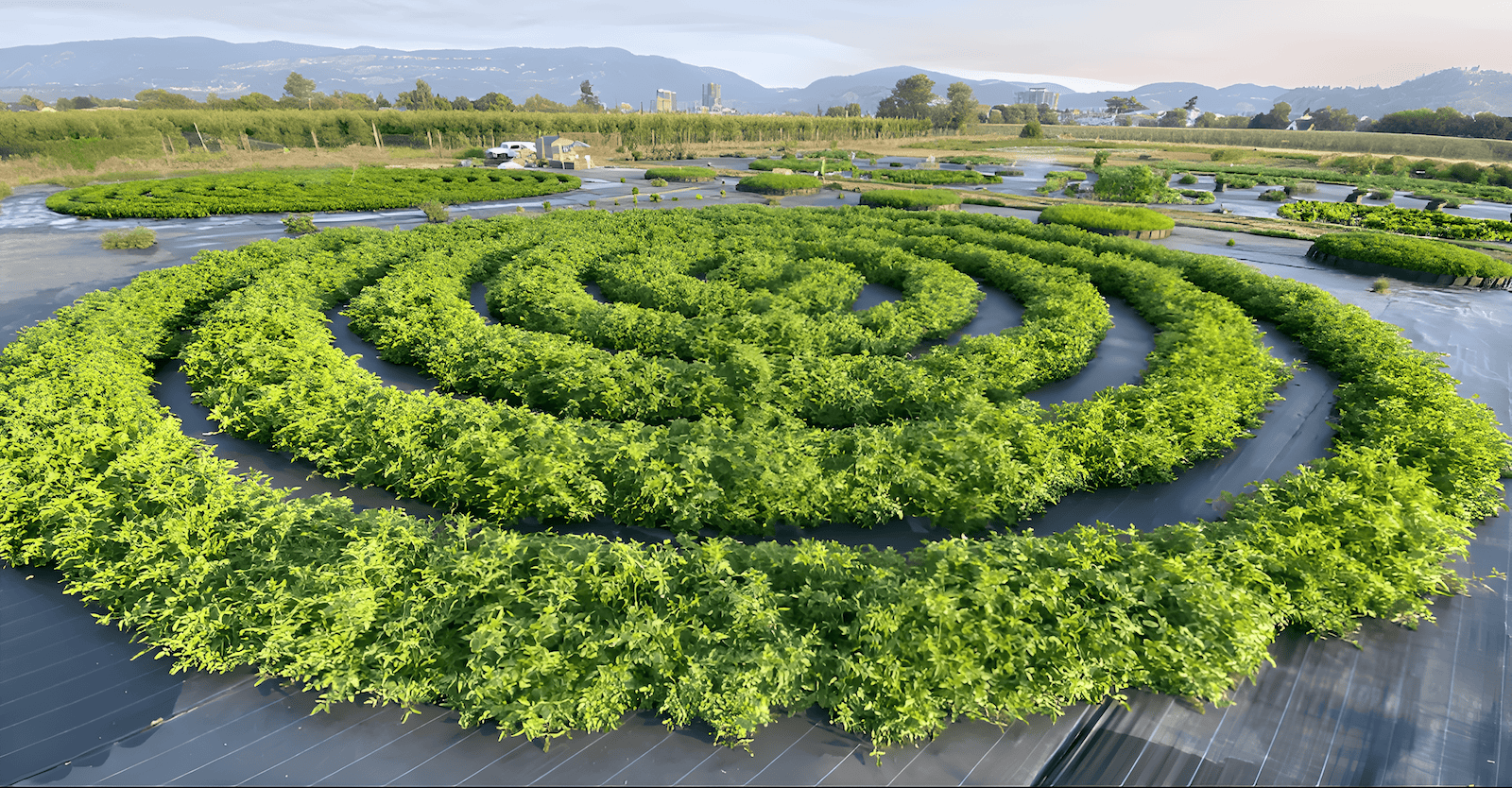
Patented and trademarked in over 40 countries, Crop Circles & is a minimum resource use, high-yield, climate adaptable technology set to disrupt global agriculture. Crop Circles & use less water, less land and grow more food in less time in any climate, anywhere!
Crop Circle Farms are a breakthrough in sustainable agriculture. These farms use pre-set circular planting patterns, optimized for maximum yield and minimal environmental impact. By integrating “drill-don’t till” agricultural technologies like pre-fertilized root tubes with water-smart irrigators, the system provides a scalable solution to a global food crisis.

Farming Small City Spaces: City land is a premium resource that is identified by the square foot rather than acres. Small city spaces are not suitable for open field farming due to production limitations - tractor pull agriculture is virtually impossible – and the high capital costs of hydroponic operations are prohibitive, so the only way to grow produce at a profit is to utilize Crop Circle Farming systems.
Island Agriculture: There are thousands of islands dotted around the world’s oceans most of which are uninhabited. Those that are not struggle with food security. Dependence on imported food has prompted many governments to explore ways to develop island agriculture; ways that are sustainable, environmentally friendly, provide employment and create food security for the islands and their people. Crop Circle Farms provides agricultural technologies suitable for small land holder farming that adapt to the natural environment in a sustainable, productive, and cost-effective way.
Arid and Semi-Arid Regions: Growing food in desert environments is challenging due to water scarcity, extreme temperatures, nutrient-poor soils, salinity, and limited biodiversity. However, the targeted agricultural feature of the Crop Circle Farm system mitigates most these challenges by utilizing grow-in-place, water-smart cavitated spaces. Perfect for food deserts.
Land Reclamation: Growing food on contaminated land can be achieved by placing a Crop Circle Farm on top of large-span, shallow-depth raised platforms that create a sealed barrier between the contaminated soil below and food-grade soil above. This design ensures the crops are grown in a safe, uncontaminated environment. A ground cover is placed over the food-grade soil to prevent weed growth, retain moisture, and act as a heat sink, which accelerates plant growth by maintaining consistent warmth. This innovative system not only rehabilitates unusable land but also supports efficient, sustainable food production in areas with otherwise unsuitable growing conditions.
Refugee Camps: The adoption and deployment of Crop Circle Farms would have an immediate impact provide nutritious produce at the point of use but the potential for agricultural training and education where people can learn to feed themselves and others. Crop Circle Farms has teamed up with Growing To Give, a nonprofit in Washington to create such an imitative.
Market Gardens: Nearly 80% of rural farmers worldwide grow food on less than an acre. Without economies of scale, smallholding farmers face significant challenges, struggling to survive or make a profit. Urban community gardens and farms face similar obstacles with restricted agricultural space. Many farms have disappeared due to urban development, leaving only small plots, often the size of a building lot, scattered throughout cities. Crop Circle Farms address these challenges by tripling production per foot in small agricultural settings, making previously unprofitable spaces very profitable for a market garden.
Food Safe: Sealed growing areas isolate crops from contaminants, while food-grade soils, clean water sources, and organic inputs provide a toxin-free environment. Ground covers prevent weed growth and cavitated fertilization vessels eliminate the need for chemical herbicides. Closed-loop irrigation systems ensure efficient water use and protect against contamination further guaranteeing a controlled and safe growing environment, making crop circle farms a reliable solution for producing high-quality, safe food.
Rooftop Agriculture: There’s a huge food growing opportunity high above everyone’s heads. With all but a few farm acres lost to development, the only space left to grow is high above the ground; on top of the roofs of cityscape high-rises. Crop Circle Farms proposes a transformative change to rooftop agriculture by colonizing city roofscapes with high-in-the-sky farms and gardens to create a building-by-building supply chain of nutritious, fresh produce for the cities of the world.
Ready to transform your land into a high-yield, sustainable farm? Let Crop Circle Farms design and build a custom, low-impact, and water-efficient farm tailored to your needs. Double your income and cut your costs in half! Contact Us
Help us expand our mission to revolutionize agriculture globally. We are seeking partners to implement Crop Circle Farms to feed people in need. Together, we can build scalable food production systems that save water, reduce costs, and feed thousands of people. Contact Growing To Give